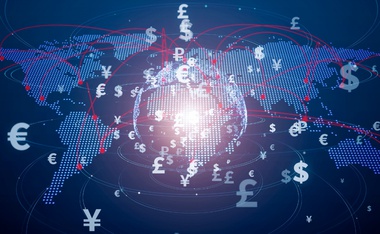The views expressed in our content reflect individual perspectives and do not represent the authoritative views of the Baha'i Faith.
Until just a few days ago I understood the phrase “the digital economy” to refer to financial transactions driven by technology, with cryptocurrency being among the best-known of these. Boy, was I wrong.
Curious to learn more, I was surprised when my search took me to a webpage published by the United Nations. My first reaction was wonderment – why would the United Nations take an interest in this?
Digging deeper, I discovered that the digital economy is vastly more complicated than I had realized and – no surprise – fraught with many of the same inequities and injustices we see around the world. In fact, the United Nations is so concerned about injustices within the growing digital economy that for the second consecutive year it has declared that the theme of the annual World Day of Social Justice – which happens today.
RELATED: Cesar, Dolores, and Fred: How an Unexpected Friendship Changed Farm Workers Forever
The United Nations has observed the World Day of Social Justice on February 20th every year since 2009. Founded by the U.N. General Assembly, its purpose is “to remember that social justice is necessary for peace, security, and development around the world” as an overall concept, and then more specifically to promote efforts to educate us about wide-ranging inequities such as poverty, gender equality, and social well-being.
The United Nations not only intends this day to drive individual awareness, but also seeks a response by institutions – including governments – around the world.
Reading about the World Day of Social Justice reminded me of the writings of Shoghi Effendi, the Guardian of the Baha’i Faith, which outline the goals of justice and global unification:
The unity of the human race, as envisaged by Baha’u’llah, implies the establishment of a world commonwealth in which all nations, races, creeds and classes are closely and permanently united, and in which the autonomy of its state members and the personal freedom and initiative of the individuals that compose them are definitely and completely safeguarded.
Originally written in the 1930s and included in his book The World Order of Baha’u’llah, Shoghi Effendi’s compelling vision of the future even presciently suggested the development of a digital economy:
… A mechanism of world inter-communication will be devised, embracing the whole planet, freed from national hindrances and restrictions, and functioning with marvellous swiftness and perfect regularity. … The economic resources of the world will be organized, its sources of raw materials will be tapped and fully utilized, its markets will be coordinated and developed, and the distribution of its products will be equitably regulated.
I compared this Baha’i vision to the current reality of our times — a system of a few hundred competing and sovereign national governments, generally characterized by authoritarian rulers or divisive partisan politics that tend to work against rather than in favor of justice. Sadly missing are (1) the search for truth, (2) a universal standard for justice, and (3) cooperation in action.
How Can We Make Social Justice a Global Reality?
On the World Day of Social Justice, what specifically does the United Nations invite us to consider?
Some of the highlights cited on its website include fairness; basic needs and opportunities within all strata of society; alignment with human rights; the effort to ensure equality for all people; and our relationship with the physical environment, with climate change being the most dramatic evidence of injustices currently practiced.
The more I learned about social justice and the digital economy, the more I realized that their intertwined concerns represent so many other issues and conditions around the world. These iconic words from Dr. Martin Luther King, Jr. say it well: “Injustice anywhere is a threat to justice everywhere.”
The United Nations reminds us that the digital economy is transforming not only financial systems but also the world of work itself. Technologies that contribute to this megatrend include expansion in broadband connectivity, cloud computing, collection and monetization of data, and the proliferation of digital platforms.
On top of all that, the COVID-19 pandemic has brought to the list circumstances such as redefining work schedules and the reassignment of many business, government, and non-profit activities to diverse locations. This major societal shift, rather than equalizing access and opportunities, has made already-existing inequalities deepen.
A Growing Digital Divide
Most notably we see a growing digital divide within, between, and across developed and developing countries — and regions within countries — particularly in terms of availability, affordability, the use of information and communication technologies, and equitable access to the internet.
Simply, the poor and the marginalized do not have the digital access they need to prosper.
Sadly, this divide has left huge numbers of people out of the digital economy, with the benefits of technology favoring some to the detriment of others. Small businesses, individuals, and many entities in under-serviced areas may lack access, not have the resources to stay up-to-date, or might be overlooked when decisions are made and funding allocated. Protections such as unions, legislation, social policies, and wage guarantees may be inadequate for groups such as itinerant workers and seasonal employees.
There is much more that I could add – but as I continued my own learning and now try to summarize it, I realize that the “digital economy” may be relatively new, but the problems within it are not. In fact, the issues are old and seemingly intractable.
How Can We Help Those Left Out of the Digital Economy?
As a Baha’i, I believe that humanity, working together, can solve these important issues.
As a start, we could begin to apply what we ready know about justice. The unity of humanity is one of the fundamental teachings in the Baha’i Faith. If we were to value the oneness of all people rather than emphasize superficial differences, suitable actions would become apparent and justice could be achieved. We can make our decisions, plan our policies, govern ourselves, and manage resources with the guiding principle being that it’s not just-us.
RELATED: Conceiving a World Commonwealth — With the Politics of Love
In decision-making and policy planning, those in a position of influence and power need to ask how to achieve justice. At the individual level, I must not take for granted my own relatively comfortable life, nor overlook the injustices that surround me. On the contrary, as an individual and as a member of organizations and institutions that operate within this society, I want to be increasingly cognizant of everyone who might otherwise be disenfranchised. Constantly asking the question “Who is missing from the conference table” would prompt more inclusiveness.
Meeting people’s material needs, providing universal access to education and technical resources, aligning every level of our society to promote economic and social justice — these are essential elements, though they are not sufficient unless public will, as articulated through its governance, is in accord.
If we allow a system such as the relatively new “digital economy” to flourish with the sole aims of technology for its own sake and generating profits – it will fail to create justice.
Until we universally acknowledge both the material and the spiritual needs and aspirations of individuals, development efforts will largely continue to fall short or fail. Human happiness, security, social cohesion, and economic justice are not by-products of material success. Rather, they result from complex and dynamic interactions among the satisfaction of physical requirements, social needs, and the spiritual fulfillment of the individual and the community.
Abdu’l-Baha promised that: “… justice will become manifest in human conditions and affairs, and all mankind will find comfort and enjoyment in life.” With this assurance from the Baha’i teachings that the future will be a just one, the challenge asks “How do we get from here to there?” To fulfill this vision for a just, unified, and peaceful world, ideally everyone will find ways to contribute.
















Comments
Sign in or create an account
Continue with Googleor